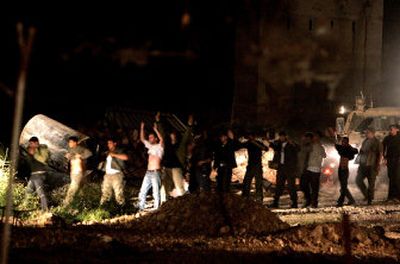Israel nabs militant in raid

JERICHO, West Bank – Israeli forces launched a surprise assault Tuesday on a Palestinian Authority prison to capture a prominent militant, sparking widespread Palestinian outrage.
The 10-hour siege ended with the deaths of three Palestinians and the surrender of a half-dozen top Palestinians whom Israel wanted. It drew vehement protests from the Egyptian border to the northern West Bank. Palestinian militants – who blamed the West for allowing Israel to stage the raid – attacked British buildings, abducted 17 foreigners and vowed to retaliate.
The assault came amid a period of political uncertainty for Israelis, who head to the polls later this month to choose new leaders, and Palestinians, who are preparing to be led for the first time by Islamist militants from Hamas.
The prime target of Tuesday’s raid was Ahmed Saadat, the leader of the Popular Front for the Liberation of Palestine. Israel has accused Saadat of orchestrating the 2001 killing of Israeli Tourism Minister Rehavam Zeevi, and it had tried to capture him a year later when the militant took refuge in the late Palestinian leader Yasser Arafat’s West Bank headquarters. After a prolonged siege, Israel agreed then to a deal that sent Saadat to the Jericho prison, monitored by a U.S.-English observation unit.
In recent months, the observers had complained that the Palestinian Authority wasn’t doing enough to ensure their safety. Last week, the U.S. and British officials in Jerusalem sent Palestinian Authority President Mahmoud Abbas a letter voicing their concerns and warning that they’d pull their monitors out of the prison if he didn’t improve security quickly.
Early Tuesday morning, the British monitors at the prison pulled out. Israeli forces were prepared to respond. Almost immediately, tanks and soldiers converged on the prison and ordered the estimated 300 inmates and staff to surrender.
Tanks fired on the walls as armored bulldozers destroyed buildings in and around the compound. The three Palestinians were killed during gunbattles.
Throughout the morning, Palestinians inside were ordered to strip down to their underwear and surrender. While most gave up peacefully, Saadat and several dozen allies holed up inside and vowed to fight to the death.
Mark Regev, a spokesman for Israel’s Foreign Ministry, defended the timing and said the Israelis were forced to move in because the Western monitors had pulled out.
In recent weeks, Abbas had suggested that he might be willing to let Saadat go if the militant’s group didn’t hold Abbas responsible if Israel targeted Saadat after his release. “We were concerned that once the monitors left, people in jail could disappear into the territories,” Regev said.
As Israel pressed in on the prison, Palestinians protested throughout the West Bank and Gaza Strip. Masked militants who blamed Britain and the United States for abandoning the prison attacked the British Council offices in Ramallah and Gaza City. Gunmen in the West Bank and Gaza Strip kidnapped 17 foreigners and scoured hotels looking for others to abduct, authorities said. Many were released within hours, but militant groups warned Westerners that they were in danger.
After prolonged negotiations, Saadat and the remaining Palestinians in the prison surrendered soon after dark. Regev said Saadat and others accused of crimes against Israelis would be tried in Israeli courts, while the others most likely would be turned back over to the Palestinian Authority.